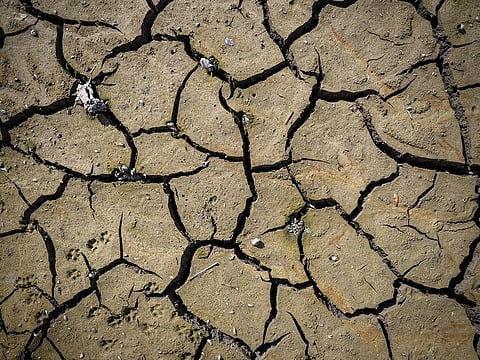Climate change demands strong political leadership
Our planet is already witnessing an increasing number of devastating natural disasters

After the Glasgow Climate Summit came to a disappointing end in November 2021, the world has been more or less occupied with the Omicron crisis, and the public and media attention on climate change has almost disappeared.
The devastating impacts of climate change are becoming more pronounced and irreversible, and the climate crisis continues to rage. The climate is changing faster than predicted, and the political leadership can’t afford to wait till the next Climate Summit in Sharm El-Sheikh, Egypt, in November 2022, to discuss again what to do about it.
Despite a compromised pact reached among 153 countries at the Glasgow Climate Summit, the United Nations Environment Program (UNEP) Emission Gap Report 2021 clearly shows that achieving the 1.5C target remains highly unlikely. The planet is warming up faster than ever.
The global surface temperature in 2021 was the sixth-highest in recorded history, and the past eight years have collectively been the hottest since the record-keeping started 140 years ago. 2021 was also the hottest on record for the world’s ocean for three consecutive years, and the past five years have been the hottest five since they started keeping the record in the 1950s.
Unprecedented sea level rise has become seriously worrisome. A new study at Simon Fraser University shows that the sea levels of the central Indian Ocean have risen to almost a meter in the last two centuries.
The global sea level has been increasing 21-24 centimetres since 1880; out of that, more than 9 centimetres in the last 27 years only (1993 to 2020). The rate of sea-level rise has more than doubled from the 20th Century to the 21st Century.
Also Read: Biden needs to unfreeze Afghanistan’s assets
Also Read: There are reasons to be hopeful about 2022
Also Read: 2021 – A disappointing year for the world
The planet is already witnessing an increasing number of devastating natural disasters, with a fivefold increase in the last 50 years. The costs of these climate events have become enormous. The financial cost of the top ten most expensive climate change-induced natural disasters in 2021 is calculated by Christian Aid to be nearly $170 billion.
In 2021, the insured loss due to natural catastrophe events was expected to be more than $100 billion. Only six times the insured costs in the world for natural disasters have crossed the $100 billion mark, and out of those six, four times are in the last five years.
The Climate Summit at Glasgow created a lot of media hype but failed to deliver any concrete result in reducing global carbon emissions or providing financial support to affected countries.
Fund to deal with the permanent loss and damage due to natural disasters is still being debated and negotiated. At the same time, climate events have caused severe catastrophes in many poor climate risk countries.
It is not that the implications of climate change are not known to world leaders who are making global policies and who are influencing it. The World Economic Forum’s The Global Risks Report 2022 came out last week, and it finds that over the next ten-year horizon, the planet’s health dominates the global risk perceptions.
As per its findings, climate change continues to be seen as the gravest threat to humanity. “Climate action failure”, “Extreme Weather”, and “Biodiversity Loss” rank as the top three most severe risks.
The majority of people worldwide are concerned about climate change. As the World Risk Poll of 2020 finds, while 41% of people globally consider climate change as a ‘very serious threat’ to their country, 28% are ‘somewhat concerned.’ Only 13% of people don’t find climate change a threat. Even in the United States, there is a major shift in public perception about climate change threats.
Engaged with the climate crisis
55% of Americans are either alarmed or concerned about global warming. In the last five years, while the alarmed segment among the American population has increased substantially, the dismissive section is losing its number. As the Yale Program on Climate Change Communication finds, Americans are becoming more worried about climate change and becoming engaged with the issue.
The threat of climate change is real, the world has already started to suffer, and the impacts are expected to intensify in the coming decades. There is increasing recognition among people about the climate risks, and they expect their governments to act.
The growing climate movements are demanding concrete actions from political leaders. However, the lack of political will has kept the world from taking concrete and decisive steps against climate change.
Political leaders will have to take tough decisions that carry risk and political costs. It is well known that long-term costs for unrestrained global warming will outweigh many times the short-term adjustment cost for climate mitigation.
However, it is a fact that political leaders are bound by practicalities of everyday politics and, in some cases, regular election cycles. Thus, there is a need for strong political leadership to agree for their country to bear the immediate costs on an equitable and credible basis.
They also need to see the benefits of working in cooperation under a multilateral framework where the risks and costs could be lowered and shared. At this critical juncture, before it becomes too late, humankind needs political will and leadership, which can take their people together in this journey to securing the future.




